Aceh survivors struggle to rebuild
Separatist conflict survivors in new fight to rebuild their lives.
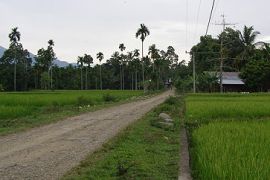
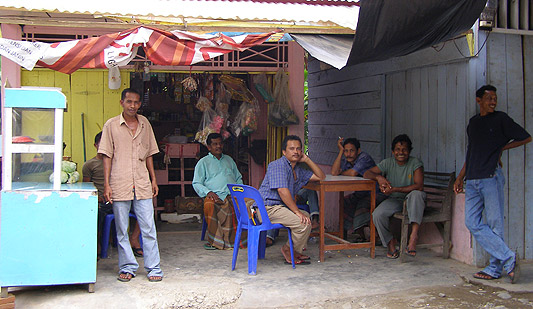 |
| Many young Acehnese men in villages close to former rebel strongholds still cannot find jobs |
Ten years ago, much of Indonesia‘s Aceh province was a no-go area where Indonesian troops and Free Aceh Movement separatists struggled for control.
These days Aceh is held up as a model for the country’s future, where differences are tolerated and embraced and where autonomy and democracy can work.
| In depth |
But almost three years after a peace deal ended the three-decade bloody conflict between soldiers and separatists, residents of the oil-rich province in northern Sumatra say little has changed.
The 2004 Indian ocean tsunami that killed 130,000 people, left close to 40,000 missing and displaced an estimated half a million in Aceh acted as a catalyst that led to the Helsinki peace agreement.
This is where Free Aceh Movement (GAM) fighters agreed to lay down arms in return for political power and self-determination, and control of the province’s resources.
Victims of the conflict that claimed 15,000 mostly civilian lives have been trying to rebuild, but some survivors say the government has not kept its side of the deal.
Desperation
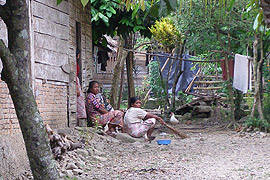 |
| Decades of conflict have left deep scars on villages across the province |
“We want jobs – that’s what we want most,” says Shukri M Amin, 35, an odd-job worker in one of the affected villages.
The government set up the Aceh Peace-Reintegration Board (BRA) in 2006 to implement the Helsinki agreement but Shukri says “we have sent our proposals to BRA but nothing happened”.
In 1990, Indonesia‘s then president Suharto deployed tens of thousands of troops to Aceh.
Shukri was a teenager when soldiers raided Cot Keeng, a remote village near Aceh’s eastern coast, and started shooting the men.
“Every man in every village near the mountains was a suspected rebel or sympathiser,” he says. “People were shot over a simple miscommunication.”
Shukri, who fled to Malaysia, says continuous army raids forced the men to run away, leaving behind entire villages with only women and children.
Thousands of civilians were killed and many simply disappeared, but the operation failed to crush the insurgency.
The peace deal in 2005 was supposed to pave the way for those who lived through the conflict to rebuild their lives.
But three years on and hundreds of affected villages across Aceh remain steeped in poverty, only trickles of the promised development coming in.
“Today we are still living in a state of neglect,” says Shukri. “The government has done very little to right the wrongs done during the conflict.”
Capital problem
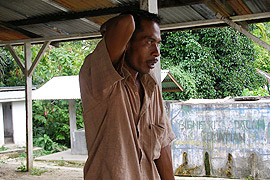 |
|
Shukri says many men ran away to |
While some in villages near Cot Keeng work on paddy fields, many in more remote locations cannot do any farming because there is no irrigation system and they have to wait for rain.
“Our problem is getting some capital,” says Shukri.
“Two years ago we sent the BRA a proposal for our own economic empowerment programme but they have not responded.”
He says many villagers, especially the widows, have been disappointed over the lack of government support.
Shukri was the only one willing to be interviewed when Al Jazeera visited his village. Many others were suspicious of people from outside.
“They feel they have wasted time talking to outsiders including politicians, aid workers and journalists who never returned to the village with help,” Shukri says.
“To them anyone who comes asking questions, taking notes and photographs, should assist them.”
Poor implementation
The BRA, with funding from the central government in Jakarta, was tasked with drawing up programmes to provide assistance, employment and compensation for former combatants and those caught in the crossfire during the three-decade long conflict.
In mid-2006, the Law on Governing Aceh was passed giving the province autonomy as provided under the peace agreement, but there was criticism that it did not follow the spirit of the truce.
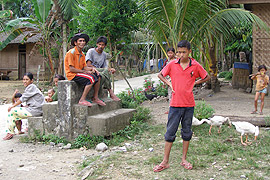 |
| Conflict victims across Aceh say the government has neglected them |
This affected the authority of the local government, and without a mechanism to regulate the implementation of policies, the reintegration programmes never properly materialised, critics say.
Under the Helsinki agreement, a Truth and Reconciliation Commission was also supposed to be set up to deal with alleged injustices during the conflict that had caused victims emotional and psychological suffering.
Eddy Purwanto, chief operating officer of the Aceh-Nias Rehabilitation and Reconstruction Board (BRR), says the local government is partly to blame.
“Nothing is moving on the commission because at least 33 implementing regulations and supporting legislations have not been enacted,” he says.
Eddy says internal fighting and political jostling in Aceh’s government and parliament ahead of next year’s national elections is hindering reintegration programmes.
“Furthermore, people here are generally distrustful of outsiders … a result of having lived through a prolonged conflict,” he says.
Some progress
Despite the slow reintegration efforts, some aid agencies have made reasonable progress on the ground.
Mercy Corps, a US-based relief organisation, has spent more than $40m to provide economic assistance to dozens of former combatants and poor villagers as part of their recovery plan for conflict and tsunami victims.
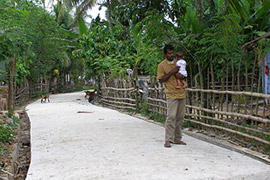 |
| Some men who escaped army raids have since returned to their villages |
In Kueh, a small village sandwiched between separatist and Indonesian bases during the conflict, several farmers are reaping the benefits of livelihood grants given under Mercy’s agro-forestry project.
The programme helps train villagers like Zamzami on composting, running a nursery of chilli seedlings, cultivating corn, cloves and other crops, as well as how best to market fresh produce.
Many others are enjoying the little pleasures made possible by the peace in recent years.
Pak Djul, a taxi driver in Banda Aceh, the provincial capital, says the prevailing mood is one of “a new experience”.
“There was a time when we could never step out after dusk,” he says while heading to the only airport in the devoutly-Muslim province. “But now people are going to work at night.”
Pointing at the ongoing construction behind the existing terminal building, Pak Djul says the central government would never have decided to expand the airport if not for the demands made by the separatist fighters.
“GAM insisted on a better airport to handle bigger aircraft and higher volume of domestic and international travellers,” he says.
“Previously, we had to go all the way to Medan [about 500km away] to catch a flight to Mecca to perform the hajj pilgrimage … all that will change once the airport expansion is completed next year.”
Many are hoping that the increased flights will translate into benefits on the ground and help survivors put the ghosts of Aceh’s bloody conflict to rest.
